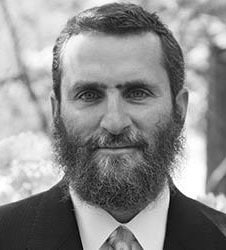In a few weeks, Eric Garcetti might become Los Angeles’ youngest mayor in more than a century. When Eric was a Rhodes scholar at Oxford University from 1993 to 1996, we were close friends and he was a regular at my L’Chaim Society.
In this age of extreme political partisanship, it’s incumbent upon those in the know to highlight the character of candidates seeking public office in a manner that transcends party affiliation. Despite my own recent run for Congress on the Republican ticket, my endorsement of Eric, a Democrat, is based on 20 years of knowing him as one of the finest students I came across in my 11 years as rabbi at Oxford.
Eric was always a very pleasant, humble, wise, sincere and serious. We would often discuss his mixed heritage, coming from a Catholic father, who was famous as Los Angeles’ district attorney, and his Jewish mother. Eric would often come to our Friday night Shabbat dinners.
But there was one unforgettable incident that really defined his character for me in a moment of terrible tragedy.
[Related: Inherent in Wendy Greuel’s being is her moral compass]
One day in 1994, I received a phone call in the late afternoon from a student who was crying bitterly. She was almost incoherent with grief. The student, who was studying at Oxford, far away from home, had just received a phone call that her beloved father, with whom she was very close, had died in a terrible accident. She pleaded with me to help her in this moment of agony. I reached her family and we all decided the best thing would be for her to return home as soon as possible. I told them I would drive her to the airport in London.
There was one problem. I had already invited Eric over to our home for a private dinner with my wife and me. Given that this was before most students had cell phones, I could not tell Eric in time that the dinner was being canceled.
I drove to the student’s college dorm, where some of her friends were helping her pack her things. We drove straight to my home, where my wife could speak to her and where she could eat something before the long night ahead of her. As we walked into the house, there was Eric. He had no idea of the night’s events. I quickly introduced him to young woman.
I said to Eric, “I’m so sorry that we have to cancel dinner tonight. You see, she has just learned that her father passed away just hours ago.”
Moments like this show an individual’s true character. Here was Eric, a popular Rhodes scholar who had come to have dinner at his rabbi’s home. What followed was an interaction that has lingered in my mind and which I will never forget.
Confronted with a total stranger’s grief and tragedy, Eric looked right at the student and, in the gentlest words, said, “I am so sorry for your pain. I’m heartbroken to hear the news. Please tell me if there is anything I can do.”
His face contorted in pain, Eric spent the next few minutes speaking with her. It was not what he said but the way he said it. He spoke with extreme empathy and understanding and the student felt that this total stranger was sharing her pain.
It is quite remarkable that nearly 20 years later I can remember the scene so vividly. What I saw was genuine human compassion for the plight of a complete stranger. I remember thinking to myself that here was a young man with a soft and special heart, that he had the ability to connect genuinely and compassionately with those who were suffering.
Eric waited around and kept emphasizing that he wanted to help in any way that he could. He refused to leave the home until the student and I departed for the airport.
For years to come, whenever I visited the student and her husband, she was so deeply touched by Eric’s caring that she would ask me how he was doing. Conversely, Eric regularly asks me about the welfare of the woman. I’m not sure if they ever met again, but for me, as a witness to a brief exchange between two people in a moment of tragedy, it was a demonstration of Eric’s desire to always be there for those who are suffering.
Indeed, Eric’s caring for those who are struggling would become his defining political legacy as a councilman and then as president of the Los Angeles City Council.
In Oxford, our organization specialized in hosting world personalities who lectured on values-based issues. About a year after this sad story, Eric was instrumental in helping me host his father, L.A. District Attorney Gil Garcetti, to lecture to our students. Gil was all over the news at the time, having been involved in the high-profile cases, such as O.J. Simpson and Michael Jackson. I remember witnessing just how close Eric was to his father and the special bond they shared. It was something that I was reminded of recently, when I was invited to the birthday party of Eric’s young child, seeing the deference and respect Eric accords his parents and the loving bond with his wife, Amy, whom I also knew at Oxford. Gil is now an accomplished photographer and the son he mentored has grown to become a special man.
It is my hope that his father will have the privilege of taking the very first photograph of Los Angeles’ newest mayor.
Shmuley Boteach, whom The Washington Post calls “the most famous Rabbi in America,” has just published his newest best-seller, “The Fed-up Man of Faith: Challenging God in the Face of Tragedy and Suffering.” Follow him on Twitter @RabbiShmuley.























 More news and opinions than at a Shabbat dinner, right in your inbox.
More news and opinions than at a Shabbat dinner, right in your inbox.